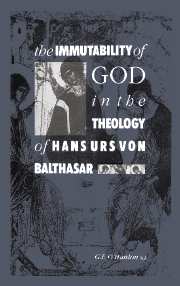Book contents
- Frontmatter
- Contents
- Acknowledgements
- Abbreviations
- Introduction
- 1 Christ and God's immutability
- 2 Creation and God's immutability
- 3 Time, eternity and God's immutability
- 4 Is the trinitarian God immutable?
- 5 Balthasar and other approaches
- 6 Final assessment
- Notes
- Bibliography
- Index of names
- Index of subjects
2 - Creation and God's immutability
Published online by Cambridge University Press: 05 October 2009
- Frontmatter
- Contents
- Acknowledgements
- Abbreviations
- Introduction
- 1 Christ and God's immutability
- 2 Creation and God's immutability
- 3 Time, eternity and God's immutability
- 4 Is the trinitarian God immutable?
- 5 Balthasar and other approaches
- 6 Final assessment
- Notes
- Bibliography
- Index of names
- Index of subjects
Summary
God created our world and entered into a covenant with men and women. This covenant involves the gradual, free, historical insertion of humankind into the life of God, a process that culminates definitively at some end-point. It is not our concern to offer a theology of creation, the history of salvation and eschatology simpliciter, but rather to present Balthasar's thought on how these areas affect our theology of God. In other words, do the act of creation, the historical interaction with creatures and the end result of that interaction affect God, matter to him, change him? This relational way of putting the question indicates that, within the rich multiplicity and variety of created kind, our focus will be mainly on humankind, so that along with the metaphysical question concerning the possibility of the very existence of created reality we will be addressing the more existential point, so important to Christian spirituality, concerning the significance of men and women for God, the sense in which their relationship with him is one of reciprocity. Can such a non-Deistic relationship be conceived without lapsing into the other extreme of a mythological God? It is one thing to concede the possibility, within the framework outlined in chapter I of Christ (who is God) affecting God; it is quite another matter, worthy of distinct and more detailed consideration, to ask whether we (who are not God, and not Christ) can also in some way affect God.
The act of creation: its presuppositions and effects
(I) We may begin by laying down the parameters of the discussion with a set of basic statements.
First, the act of creation does not change God.
- Type
- Chapter
- Information
- Publisher: Cambridge University PressPrint publication year: 1990



